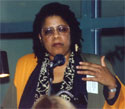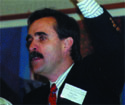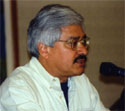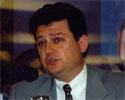Summer 1999
Community Journalism Summit, San Francisco
A diverse group of about 80 journalists met in San Francisco, May 21-23, for a “Community Journalism Summit,” co-sponsored by the Pew Center, the Maynard Institute for Journalism Education and the San Francisco Examiner. Some highlights:

Erna Smith, Chair, San Francisco State Journalism Department, Dinner Keynoter: “It’s through journalism that we, by and large, experience life through our own backyards…Race, class, gender, age and geography are the connecting characteristics.”

Sandy Close, Executive Editor, Pacific News Service: “Kids have shown me we are becoming a culture of “aloners.”
“…I asked one: ‘What’s the worst thing people call you? Faggot?’ And he says, ‘No, it’s when you’ve been in school for three months and the teacher doesn’t even know your name.’
“…The awe of what we don’t know is what we need to recover.”

Annie Nakao, Reporter, San Francisco Examiner: “My motto is: If we can’t inform, then don’t inflame.”
What changed after the “New City” project? “What’s changed is people’s ideas of stories. People will say: That’s a ‘New City’ story.”

Raul Ramirez, News Director, KQED-FM: “Get beyond the gatekeepers. Look at the community publications. Get them translated. Find out who’s being quoted. Find out where do you go to learn about things. Or ask the gatekeepers: Who disagrees with you? Who agrees with you?”

Chris Peck, Editor, The Spokesman-Review, Spokane: “We’ve done a lot of listening. We drill down narrowly and report wide and shallow. We really need to report wide and deep.”
We are trying to “develop a map that would show key moments – when something happened in their lives – that led young people to prison.”

Associate Editor Frank del Olmo says the Los Angeles Times is trying to recapture its “psychic connection” with its Latino community. “We can’t practice journalism as usual any more. Anytime we practice drive-by journalism, it will come back at us 2, 3, 5 years later – much worse than before.”

Jim Carney, News Director, BronxNet, cable network, which works with paid and unpaid interns, partnering newspapers, television and radio. “Gone are the days when we only do print…You’ve got to be able to cross all the media boundaries the same way young people have to cross all the multi-cultural boundaries.”
